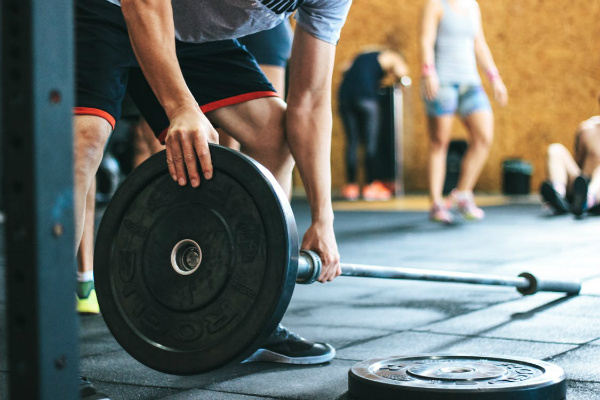B vitamins are responsible for hormone production, protecting the sheath around nerve cells, metabolizing the foods we eat into energy and healing damaged muscles.
Not just that… they’re also responsible for supporting our energy-producing pathways in the brain while creating new blood cells and assisting in the delivery of amino acids such as L-Leucine into the muscles, and much, much more.
A lack of B-vitamins in the diet has been shown to directly impact physical training – more specifically, the type of exercise that requires higher intensity and focus.
Athletes commonly lack B vitamins and other essential minerals. This is not down to a poor diet plan per se, or less availability of supplements. It may be, however, a failure to understand their own requirements when it comes to the demands set out by themselves or their trainer. Why is this?
When the dietary reference intakes were first set out for the use of B-vitamins, there was inadequate information available for the ‘specific requirements’ needed for active individuals. (01)
Therefore, the recommended daily allowance (RDA) or adequate intake (AI), fall short for active individuals. This makes supplementation an important part of anyone’s dietary regime for recovery and performance.
In this article, I’ll discuss the different types of B-vitamins, how they benefit our training goals, and how they work within the body. Along with food sources and the recommended doses of B-vitamins.
Table of Contents
Benefits Of B-Vitamins

Increased Performance and Cellular Recovery
When taking part in exercise, the metabolic pathways are stressed. Therefore, the requirements for additional nutrients used in these pathways are increased. Not only that, but the muscles will also need more b-vitamins to repair ‘micro tears’ in the muscles.
When strenuous activity occurs, it increases the rate at which we sweat and pass urine for example. Therefore, a loss of nutrients and B-vitamins will no doubt be lost at a faster rate compared to a sedentary individual.
The loss of b-vitamins can also be attributed to climate (hot weather) and the consumption of large amounts of water required for hydration. (02)
Supplementing with B vitamins (as a complex formula) works to offset the loss of nutrients. As they support the delivery of key nutrients into the areas where they’re needed the most. Ultimately, B vitamins help the entire body and mind to recover more efficiently on a cellular level.

Improved Hormone Production
Flavin adenine dinucleotide (FDA) and flavin mononucleotide (FMN) found in riboflavin (one of the B-vitamins) are two important coenzymes that are responsible for the metabolism of foods to be used as energy – more importantly, in the case of hormones.
FDA and FMN are crucial for metabolizing steroid hormone production from the foods we eat – making riboflavin a key player when it comes to hormone regulation. Why is this so important?
B vitamins, for example, can help you lose weight. If your hormones are imbalanced, then, chances are, you’ll struggle to lose weight. It’s critical for your hormones to be in balance (for your gender) in order to lose weight efficiently. (03) Meaning, a man must have healthy amounts of testosterone, and women must have healthy estrogen levels.
One thing to note is, women’s hormones do change through their ovulation period. Therefore, training with intensity for a given sport as a woman requires careful nutrition and supplementation planning in order to obtain optimal health and performance. Why? During the ovulation period, women can lose essential levels of iron, which contributes to the support of hemoglobin, and also, optimal hormone production.
If you a looking to build strength and muscle, testosterone production is especially important for both men and for women. One way to increase testosterone is through the use of adaptogens such as ashwagandha.
By having healthy levels of the ‘right‘ kind of hormones (less cortisol and more testosterone/estrogen depending on gender) you’ll set yourself up for success – this is where b-vitamins can help.
Metabolizes The Foods We Eat
One major benefit to supplementing with B vitamins is the way it helps the body metabolize the foods we eat into energy.
Learn more about energy production in this article > Mitochondria and Energy Production
If we do not have enough B vitamins available as a complex, then, the chances of obtaining the right kinds of nutrients to repair the body after exercise, or equally for optimal health, will be greatly limited. (04)
It’s the role of B vitamins to make sure the mitochondria get the right kinds of fuel to create energy and repair the body.
In short, B-vitamins metabolize fats, carbohydrates, and amino acids throughout the entire body which are used for repairing damaged muscle tissue, along with the creation of ATP.
Types of B Vitamins
While each B-vitamin plays its own unique role in the body, you’ll find similarities in each of these ingredients that make up the complex nature of B-Vitamins. However, this doesn’t mean to say you should take one without the other.
Each B-vitamin supports the other. Meaning, if you decide to take only one type of B-Vitamin. Then, there’s a chance it may not work as efficiently as it would if you were to use a B-vitamin-complex.
Let’s dive into the types of B-vitamins available and how they benefit your performance and overall health.
Thiamin – B1
Thiamin is important for the metabolization of carbohydrates, fats, and proteins – especially branch chain amino acids BCAA’s – L-Carnosine, L-Valine, and L-Leucine.
Inside thiamin is an element called ‘thiamin pyrophosphate’ (TPP). This acts as a coenzyme in numerous critical key reactions within the ‘energy-producing pathways’ in the body. These pathways are stressed during physical activity, therefore, Thiamin acts as a buffer for the loss and usage of B-vitamins stored in the body during and after exercise. (05)
Having enough TPP is important as it’s the enzyme that converts pyruvate to acetyl-COA. This process takes place in the creation of energy, via the mitochondria.
To summarise; thiamin is needed for the aerobic metabolization of fats, carbohydrates, and amino acids for the use of energy in the form of adenosine triphosphate – ATP.
Ideal Dose of Thiamin: 4mg

Riboflavin – B2
Riboflavin is an essential component of two coenzymes – flavin adenine dinucleotide (FDA) and flavin mononucleotide (FMN). These coenzymes take part in the transfer of electrons in energy production and the metabolism of amino acids to be used as energy.
Not only that, FDA and FMN are also responsible for the metabolization of steroid hormone production. (06)
This makes riboflavin an important B vitamin as it assists in the transfer of electrons that are used in energy pathways in the ‘electron transportation chain’ for the creation of adenosine triphosphate ATP.
In summary, without riboflavin (B-vitamins) available, the body wouldn’t be able to perform at its peak as the pathways, and energy sources used such as amino acids, carbohydrates, and fats, cannot be utilized to their full potential for energy production in the mitochondria.
Furthermore, riboflavin assists in the conversion of vitamin B-6 into its usable form. Therefore, without a variety of B-vitamins available, the body cannot utilize the foods we eat efficiently to create energy or regulate our hormones. This makes using a B vitamin complex more favorable than supplementing with one ingredient individually.
Ideal Dose of Riboflavin: 4mg
Niacin – B3
Niacin, just like all B vitamins, helps to metabolize the foods we eat into energy, while regulating our hormones. However, there’s one benefit to niacin that is different from the rest, and that’s its ability to assist the brain.
In the words of David O.Kennedy from the Brain, Performance, and Nutrition Research Centre in the UK:
“In the absence of an optimal diet, administration of the entire B-vitamin group, rather than a small sub-set, at doses greatly in excess of the current governmental recommendations, would be a rational approach for preserving brain health”. (07)
Niacin can improve brain function and the ability to think more clearly, or at a quicker rate. It does this thanks to NAD and NAPD, which are two coenzymes responsible for cellular metabolism associated with energy production for the mind.
Without NAD and NAPD which comes from niacin, the mind would struggle to work efficiently. Resulting in confusion, depression, and the inability to focus.
Niacin can also lower triglycerides by 20%, and in some cases by 50%. It does this by stopping the action of an enzyme involved in triglyceride synthesis. High levels of triglycerides are liked to high blood pressure, diabetes, obesity, high levels of bad LDL cholesterol. (08)
Ideal Dose of Niacin: 20mg
Pantothenic Acid – B5
Pantothenic Acid is needed to synthesize coenzyme-A (CoA). CoA is part of the process which creates energy in support of the mitochondria, thus resulting in the release of adenosine triphosphate ATP.
The more efficiently our mitochondria works to produce ATP, the better our endurance, power, and strength will be. Effectively, the mitochondria are the ‘powerhouse‘ of energy production.
Therefore, making sure we support the synthesis of all elements that make up the energy production process within the body, should be adhered to thoroughly.
The name Pantothenic comes from the Greek word ‘pantothen‘ which means ‘everywhere.’ It was given its name as it can be found in almost all food groups. However, the main sources are fortified cereals, egg yolks, liver, and dried mushrooms to name a few.
Ideal Dose of Pantothenic Acid: 20mg

B6
B-6 plays a major role in the use of amino acids for energy and the repair of muscle tissue. Glycogen breakdown is another benefit of using vitamin B-6.
The amino acids eaten from foods such as chicken, beans, lentils etc, along with carbohydrates such as pasta, rice, and fruits are metabolized by B-6. They are then sent to the mitochondria to be created into ATP.
The active form of B-6 is known as pyridoxal phosphate (PLP) which is a cofactor for enzymes involved in protein transmutation and deamination (the removal of an amino group from an amino acid) reaction.
In simple terms, this means, the more protein consumed by an athlete will require additional vitamin B-6 to cope with the breakdown required to utilize the amino acids found in proteins.
Ideal Dose of B6: 4mg
Biotin – B7
Biotin, which was formerly known as vitamin H or coenzyme R is important for the utilization of fats to be converted into energy in the mitochondria to form ATP.
You’ll also find biotin in many hear and skin products as it’s linked to supporting the growth of strong hair and nails. Not only that, it can also improve eyesight while assisting in the detoxification of the liver.
What’s interesting about biotin is… it helps in the displacement of carbon dioxide, and with it, waste products from food sources which are removed from the body – allowing for faster cell regeneration.
Biotin can also balance blood levels. This may be a benefit to diabetics, or those on a high-calorie diet which consist of carbohydrates, such as triathletes or other endurance sports.
Ideal Dose of Biotin: 300mcg
Folate – B9
When exercising hard, or on a continuous basis, our red blood cells, muscles, and DNA can feel the strain from oxidative stress. Therefore, we need to counter the negative effects of the types of stressors that exercise creates. This is where folate comes in (the manmade form of folate being folic acid).
Folate is another type of enzyme similar to riboflavin, in that it assists in DNA synthesis, amino acid metabolism, and possibly one of its greatest benefits – cell division. This makes folate a vital ingredient for the growth and repair of blood cells and muscle tissues. (09)
Ideal Dose of Folate: 400mcg
Vitamin B12
B-12 is a coenzyme that is necessary for the formation of red blood cells. Without enough B-12, metabolic anemia would be present – making you feel tired and weak.
Anemia is responsible for a lack of energy, brain fog, and more serious side effects which are listed below:
B-12 deficiency Side Effects
- Shortness of breath and headaches
- Difficulty concentrating
- Dizziness
- Pale skin
- Leg cramps
- Insomnia
B-12 will also aid in the body’s nerve signaling pathways, much in the same way thiamin does – making it a vital B-Vitamin to help keep your energy levels high. It restores energy levels as it aids in the delivery of key nutrients to muscle cells and tissue while supporting the creation of new blood cells.
Most B-12 deficiencies are noted to reflect inadequate absorption rather than a lack of B-12 in the diet, to begin with…Why is this?
A lack of ‘hydrochloric acid’ or an ‘intrinsic‘ factor is the main cause of B-12 deficiencies. Hydrochloric acid is needed for the release of the vitamins contained in foods, more specific proteins. Therefore, if hydrochloric acid isn’t present, the body will not be able to obtain B-vitamins from the foods we eat to begin with.
Central Nervious System Benefits
Another interesting point about B-12 is: B-12 is essential in the nervous system because it helps to maintain a healthy sheath coat surrounding nerve fibers.
If these nerve fibers aren’t protected, nerve signaling can be interrupted. The result of this?
Numerous neurological problems would accuse, such as partial or complete paralysis, muscle weakness, partial or complete loss of sensation, seizures, difficulty reading and writing, poor cognitive abilities, unexplained pain, decreased alertness. (10)
It’s also worth mentioning that B-12 and B-6 combined work together to keep blood levels of homocysteine low – too much homocysteine and it could lead to blood clots.
Furthermore, B-6 and B-12 support the metabolism of methionine – a powerful amino acid which regulates cell growth, DNA formation, and cell repair. (11)
Ideal Dose of B12: 50mcg

Food Sources of B-Vitamins
Food sources which contain B vitamins are dark leafy green vegetables, a wide variety of meats, and fortified cereals to name a few. Here’s a list of the highest concentrated sources of B vitamins found in foods:
- Whole grains (brown rice, barley, millet)
- Meat (red meat, poultry, fish)
- Eggs and dairy products (milk, cheese)
- Legumes (beans, lentils)
- Seeds and nuts (sunflower seeds, almonds)
- Dark, leafy vegetables (broccoli, spinach, kai lan)
- Fruits (citrus fruits, avocados, bananas)
Courtesy of healthxchange.sg (12)
Are B Vitamins Worth It?
B vitamins are crucial for maintaining our health, especially that of an active person as they can become quickly depleted via sweat, and urine – which increases during training and maintaining hydration levels.
B vitamins ensure that energy can be produced, and with it, the support of adequate recovery after physical training.
Athletes, or anyone who exercises on a regular basis with a poor (or marginal) diet, will potentially have a decreased ability to perform exercise in the manner associated with high-intensity training.
However, the good news is, supplementing with B vitamins, or enriching your diet with plenty of foods which contain B vitamins can offset the lack of performance and recovery demands linked to low vitamin B levels.
While each person’s requirements for B vitamins will vary depending on age, height, weight and activity levels (and type of exercise). We can safely assume that if you’re an active individual, the RDA for B vitamins will not meet your current requirements. This is due to a limited knowledge of requirements for athletes when the guidelines were first set out on B vitamin usage.

Conclusion
In the future, more testing needs to be done in regards to metabolic studies using highly active individuals. By doing this, we’ll be able to determine more accurate dosing suggestions for vitamins as a whole.
To finish off, let’s not forget that deficiencies are commonplace among athletes and regular gym goers. As there is little awareness in the general public in regards to increasing the number of B vitamins needed to replenish the body. This makes supplementation an integral part of a healthy lifestyle for any active individual.
I suggest using a B vitamin complex, as this will help to assist other B vitamins, and their roles within the body. Just like a having a balanced diet is key to success where variety is paramount, so should be the vitamins you use to support your health and training.
Singular ingredients may work in some cases, as for B vitamins, they work better when combined as a complex formula.
Resources
(01) Vitamin D and the Athlete: Risks, Recommendations, and Benefits. (source)
(02) The Effect of Exercise and Heat on Vitamin Requirements. (source)
(03) Vitamin supplementation during weight reduction–favourable effect on homocysteine metabolism. (source)
(04) Dietary Supplements and Sports Performance: Introduction and Vitamins.(source)
(05) B vitamins and folic acid. (source)
(06) Nicotinamide Adenine Dinucleotide. (source)
(07) B Vitamins and the Brain: Mechanisms, Dose and Efficacy—A Review. (source)
(08) High Triglycerides: What You Need to Know. (source)
(09) Vitamin B-12, folic acid, and growth in 6- to 30-month-old children: a randomized controlled trial. (source)
(10) Neurological Problem Symptoms, Causes and Effects. (source)
(11) What Is Methionine? (source)
(12) Vitamin B: Best Food Sources and Signs of Deficiency . (source)

Leave a Reply